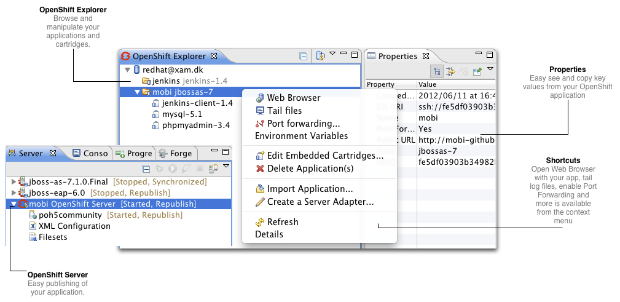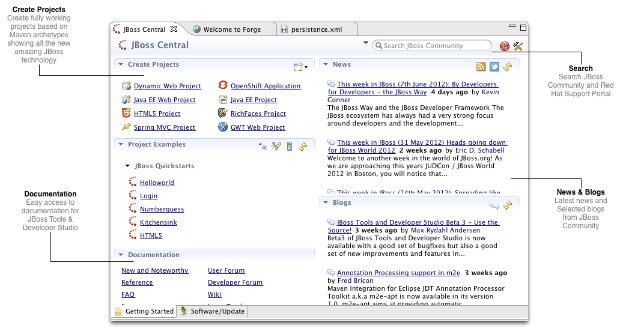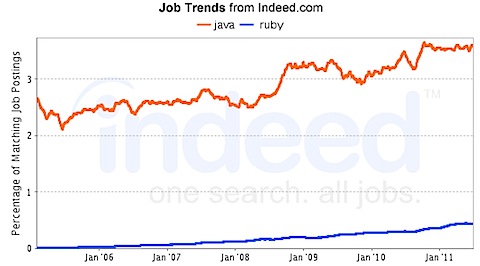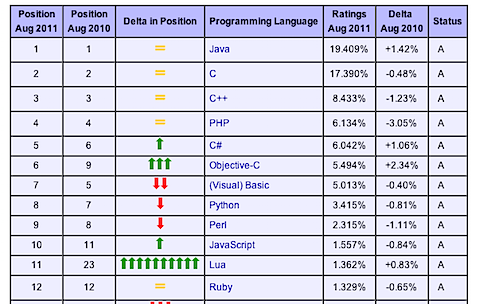In last week's entry we recapped that Red Hat had acquired yet another company. This time it was Polymita.
Mark Proctor shares his thoughts on the acquisition and I'm sure we'll be hearing a lot more from him and his team and the integration of the company begins. And whilst we're on the subject of the very prolific extended Drools team, it's worth pointing you at some other things they've been up to this week including Geoffrey on Drools Planner, a very interesting article on the UIs necessary for good human task interactions (time to get involved too if this is of interest to you), and also there's the IntelliFest Drools & jBPM Workshop in San Diego next month, where you can meet the entire team.
Moving on to some non-Drools related activities, we've got more activity in the Arquillian project with the release of an alpha version of their persistence extension, the first candidate release of Seam 2.3.0 is out (congrats to the team!!). Randall has written a nice article on a new feature in ModeShape 3, that of respository backup and restore. As he says in the introduction:
"There are several reasons why you might want to restore a repository to a previous state, and many are quite obvious. For example, the application or the process it’s running in might stop unexpectedly. Or perhaps the hardware on which the process is running might fail. Or perhaps the persistent store might have a catastrophic failure (although surely you’re also using the persistent store’s backup system, too). But there are also non-failure related reasons. Backups of a running repository can be used to transfer the content to a new repository that is perhaps hosted in a different location. It might be possible to manually transfer the persisted content (e.g., in a database or on the file system), but the process of doing so varies with different kinds of persistence options. Also, ModeShape can be configured to use a distributed in-memory data grid that already maintains its own copies for ensuring high availability, and therefore the data grid might not persist anything to disk. In such cases, the content is stored on the data grid’s virtual heap, and getting access to it without ModeShape may be quite difficult. Or, you may initially configure your repository to use a particular persistence approach that suitable given the current needs, but over time the repository grows and you want to move to a different, more scalable (but perhaps more complex) persistence approach. Finally, the backup and restore feature can be used to migrate to a new major version of ModeShape."
So take a look and provide feedback, because ModeShape 3 will be a significant advancement.
And finally for now, Eric has written something to help anyone who wants to try out the JBossWorld 2012 keynote demo for themselves at a JBUG or elsewhere!
Well hopefully you don't need this blog to tell you the major stories of the past week! EAP 6.0 and the JBoss Data Grid 6.0 are out! As I said in my announcement blog for EAP 6.0:
"The feedback we've received since the first community releases has been overwhelmingly positive, as has the early access feedback. And we've even managed to find time to put it on to OpenShift, where it has been successfull as well! I'm confident that we'll build on this success as we move forward with point releases for EAP 6, other products that will be based on EAP 6 and of course, slightly longer term, EAP 7 and beyond! After having seen how well we've worked as a unified team (engineers, QA, docs, support, product managers etc.) I don't think there's much we can't do if we set our minds to it!"
It really has been a monumental effort! And with JDG 6.0 we enter the supported NoSQL/Big Data space, which is another huge achievement! In fact this week could be called the "GA Week", because Max just announced the availability of JBoss Tools 3.3 and JBDS 5.0! There is way too much good stuff in JBDS 5.0 to summarise here, so you should go read the blog entry. And some nice pictures might encourage you to do so
And of course we've had our usual slew of project releases, including BoxGrinder 0.10.2, JBossOSGi 1.1.1 and IronJacamar 1.1.0.Beta1. Amongst this flurry of release activity the team has also had time to discuss a few things going on elsewhere. For instance, Jonathan Halliday talks about the problems with trying to fake transaction semantics, something which we see a fair bit in some NoSQL/Big Data solutions out there (fortunately not ours, of course!) Andy Miller is giving his regular performance slot at JBossWorld next week - I'm sure it'll be packaged as usual! And Hardy talks about Hibernate OGM and the kitchensink example - yet more on NoSQL! Finally congratulations to Mark Proctor and the team again, for another sell-out world tour!
OK so there you are. A whistle-stop tour of JBoss activity this week. Next week is JBossWorld/Red Hat Summit, so you can expect a lot more announcements and things going on. If you haven't registered then there's till time. And of course we've got JUDCon at the start of the week so you should definitely come to that too!
Before we start, let me say Happy Star Wars Day!
So after last week's GSoC focus, this week we have a lot breadth to cover. Let's get straight to it with the announcement of the winners of the JBoss Community Recognition Awards! Our communities are a critical element in the success of JBoss and our projects, so being able to recognise key members of those communities is a great way for us to show our thanks. Hopefully all of these winners will be taking up the offer to come to JBoss World and we'll be sure to make them feel even more welcome than they already are. In fact one of the winners, Markus Eisele blogged about how happy he is to be recognised, so check that out too.
The Errai project just keeps delivering. Mike Brock has posted the second part of about Errai IOC and if you haven't checked out the first part then you should definitely do so. Whether you're interested in GWT, mobile or just like to follow what Mike and the team are doing, Errai is definitely a project to watch. Another one to keep an eye on is Teiid, and Ramesh discusses how the latest 8.0 release brings Data Virtualisation to AS7. And the relative newcomer to our project portfolio, AeroGear, was represented at OpenCloudConf recently by Kris, who talks about his experiences and things going on in the project.
We all know that EAP 6 is coming soon and that AS7.1 is a significant improvement over previous releases. We also know that some of that is due to EE6 being significantly better than previous versions. However, that does lead to a potential migration headache if you want to move your code from an EE5 container to EE6. Well Shane Johnson has kicked off what could be an extremely important (and interesting) series of articles on how to tackle the migration.
There were quite a few of use at Devoxx France and some had the pleasure of being caught on camera! Here's Stef, a core member of the Ceylon team, talking about the language and community involvement. And Gavin has more to say on some changes in the language too. Emmanuel, in his inimitable style, discusses Devoxx and other parts of the "French Revolution", though whether or not he is right in his title is open to debate
We have our usual series of project releases. Congratulations to the Weld team for getting Alpha2 of 2.0.0 out, with the CDI 1.1 TCK. And ModeShape 2.8.1 went final this week. If you're interested in JCR then of course you should check it out. However, ModeShape is shaping up (no pun intended!) to be far more than just JCR. If you are at all interested in NoSQL then you may find some of the features in this release and the intended 3.0 release to be relevant. Hardy and team have also pushed out Hibernate Validator 4.3.0.CR1, which they hope will be the only CR before the final release. Jesper announced the release of IronJacamar 1.0.0.Alpha7 as well as outlining the road ahead.
And it appears that the entire TorqueBox team is "happy as kids around a maypole on May Day", as they mention for the 2.0.2 release. Absolutely no comment on which team members are wearing the dresses in the picture!
Finally, don't forget that Max and team have produced the latest Asylum podcast! OK, that's it for this roundup. Enjoy!
There's a lot going on in the world of JBoss and it seems like most of it happened in the last week! So summarising is more of a challenge than usual: what do we mention and what do we hope you'll go and check for yourselves? But this is a good position to be in, as it shows we continue to have a lot of thriving communities pushing the innovation on a day to day basis. Of course it then raises another question: where to start? Well if you look through everything that's happened in the past 7 days, that's actually a little easier to answer. Google Summer Of Code has come to JBoss in full force! There have been a lot of people on the JBoss side involved in making this a reality this year, including Anil and Dan, but Dan summarises it best:
"The much anticipated announcement about which students were selected to participate in the 2012 Google Summer of Code program was published earlier today. In total, there are 1,212 students participating. We’d like to congratulate all the students accepted and wish you all best of luck this summer! The JBoss Community is proud to be participating as an independent mentor organization for the first year. We were selected thanks to a strong showing of volunteer mentors and an overwhelming number of compelling and creative ideas."
We are really proud of our involvement in GSoC and pleasantly surprised at the quality of the students who applied. You can check out the individual blog posts, but we have acceptances covering RHQ, Arquillian, Forge and Infinispan. Once again, congratulations to everyone who was successful. Thanks to everyone who applied to participate. And extra special thanks to all of those who helped to get us to this stage, especially the mentors who now take on the next phase. Hopefully we can build on this success for next year too!
OK, so what else has been going on this week other than GSoC? Well for a start Shane has written a great piece on how to import a Maven project from GitHub into the early access version of JBDS 5. Heiko Bruan has been doing a lot of work recently on domain management for AS7 and has written up some of his observations and tips in a couple of entries. The first is on how to debug a domain setup with multiple hosts involved when you only have a single physical machine, whereas the second is about configuring a domain on virtual network interfaces. Prahbat has written an interesting article on why it has taken us so long to produce a supported version of Infinispan when it's been in the community since 2009. The issues that Prahbat discusses, such as ensuring scalability and resilience, may seem specific to Infinispan, but in fact most of the underlying reasons behind the 3 year "delay" are critical to the way in which Red Hat works when taking community projects into platform. We work closely with our communities, productisation teams, QE teams etc. to ensure that the products we create and the best they can be; if that takes a while then we'd rather delay than put our users and customers at risk.
We've also had the usual flurry of project releases, including the Arquillian Extension Jacoco 1.0.0.Alpha3 and HornetQ 2.2.14. Congratulations to those teams! And from what Mircea mentions in his blog, it seems that the Infinispan teams collaboration in the Cloud-TM effort is working out really well, with some significant improvements to Infinispan that go way beyond what other implementations have to offer currently. Again, great work to the Infinispan team and to their wider community!
OK, that's it for this week. Definitely busy!
It looks like it's my turn again to give everyone an update on the world of JBoss over the past week. Before I dive in, it's worth mentioning that next week's editorial should cover all things Devoxx related and since I was at QCon San Francisco during the week, I'm looking forward to hearing what everyone has to say too!
So we started the week with a quick look back at something that happened at JUDCon London earlier this month: the JBoss Asylum podcast, hosted as usual by Max and Emmanuel (I still expect them to open these podcasts in a very Robin Williams 'Gooooood morning JBoss' shout!) In this episode the team decided to do a panel session on Polyglot JBoss, i.e., what non-Java languages are we using or thinking of using in the future. As you can guess, this has a lot of relevance with JBoss Everywhere.
Since we're talking about JUDCon, it's worth mentioning or reminding everyone that the next event will be in just over two months time in Bangalore. If you haven't submitted something already then you should definitely get a move on, and of course don't forget to register and attend. Although we don't know yet who will be presenting, it's certain from what they've said this week that both Heiko Braun and Mark Proctor are hoping to be present and would make any JUDCon a place to be at!
Someone else who may be at JUDCon India is Kris Verlaenen, jBPM lead, and who this week had a lot to say about executable BPMN 2.0 and jBPM:
"Bruce Silver did a blog recently, wondering whether any tools already exist that truly support executable BPMN 2.0. He defines supporting executable BPMN 2.0 as not just following the graphical notation guidelines (that are probably not that different from BPMN 1.x), but also supporting the underling XML serialization. And not just the basic high-level elements, but also the details that are necessary to come to executable processes, like process data, data mappings, service interfaces, etc. I believe that jBPM satisfies these requirements!"
So check out what he has to say and also give jBPM a try. It's evolved a lot since jBPM 3 and is already a critical component by itself, but also within several other projects and platforms.
There were a couple of announcements this week related to tooling. The first was from Max, or rather Max commenting on an announcement from Google that they had finally open sourced their Eclipse plugin. As Max says: "With the open sourcing of the plugin we are looking forward to working even more closely with the Google team and the rest of the community on making the developer experience even more productive and an integrated part of Eclipse platform."
The second was from me about work we've been doing across the company on improving the developer experience for OpenShift, our public PaaS effort. There's a webinar on the subject tomorrow (21st of November), so register for that and hear from Max and others directly, as well as be able to ask your questions.
Finally we have the usual project announcements, including BoxGrinder 0.9.8, another CR for Hibernate Search 4.0.0, the first CR for Teiid 7.6, and last but by no means least, Bela talked about the jGroups 3.0.0.Final release.
OK, that's it for this week. It hasn't been as announcement-full as other weeks, but I suspect that's because everyone has been busy producing things to talk about next week!
We're a little late with this editorial review, but then we have been fairly busy. For a start, we've just announced the dates for the first APAC JUDCon, in Bangalore!If you haven't been to a JUDCon before then you can check out the previous events we've held in the US and Europe. Hopefully these will convince you to either submit something for consideration of the program committee, or register to attend. If you're interested in JBoss, (and let's face it, if you weren't then you probably wouldn't be reading this entry!), then JUDCon is the place to come and hear what's happening and help shape it too.
Another hugely significant announcement this week was from Max and the JBDS team, with the aptly named Shift Happens, 3.3 M4 release.
As Max describes, when you first start it up you'll see the new JBoss Central "dashboard", which includes quick links to access common things such as the quickstarts, as well as the JBoss blog roll.
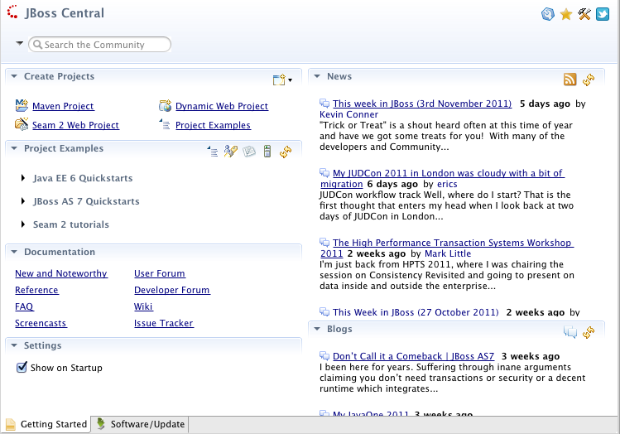 But probably the biggest addition to this release is integration with OpenShift, so now you can develop and deploy directly within JBDS. Other new things in this release include Richfaces 4, colourised Forge, and improvements to JBoss OSGi integration. Lots to check out!
But probably the biggest addition to this release is integration with OpenShift, so now you can develop and deploy directly within JBDS. Other new things in this release include Richfaces 4, colourised Forge, and improvements to JBoss OSGi integration. Lots to check out!
We had a few new releases this week, with Weld 1.1.3.Final, quickly followed by SP1(!), Hibernate Core 4.0.0.CR6 and Richfaces 4.1.0.M4.
There was quite a lot of transaction-based discussions this week too! First we had Galder from the Infinispan team talking about locking improvements in the 5.1.0.Beta4 release. As he puts it: "A hugely important lock acquisition improvement has been implemented that results in locks being acquired in only a single node in the cluster. This means that deadlocks as a result of multiple nodes updating the same key are no longer possible. Concurrent updates on a single key will now be queued in the node that 'owns' that key."
Then Mircea talked about the single lock owner feature in Infinispan: "The basic idea behind it is that, when writing to a key, locks are no longer acquired on all the nodes that own that key, but only on a single designated node (named "main owner")." If you read the entry from Mircea and the associated wiki page, you'll learn about how this can improve the performance of your Infinispan applications. He also wrote about how, if you're using pessimistic concurrency control, Infinispan will re-order your lock acquisitions to automatically avoid/reduce deadlocks. Very nice! In fact Mircea had a pretty busy week all told, with yet another blog entry on pessimistic transactions which were added in the 5.1 release.
Finally Jonathan had a few things to say about Spring and JPA configuration. In general people go to extremes to try to remove the need for transactions from their applications without actually understanding what it is that they're doing and how, at least in this case, they end up having done a lot of work for no good reason at all! I won't summarise the posting because it's well worth a read. However, it is worth quoting this: "You probably should not bother to invent a better mousetrap until you've determined that current mousetraps don't catch your mice. The imposed cost and complexity are definitively unnecessary."
OK, so that's it for this week. Hopefully you found this summary useful and we'll try and keep on schedule for next week
We've been very busy over the past week, what with more Cloud/OpenShift activities, getting ready for JavaOne and JUDCon London, it's hard to know where to start. So let's dive in chronologically
- So we finally officially announced JUDCon London 2011, which is happening alongside JAX London. The Call for Presentations is short this time, due to some logistical issues, so you should hurry to get your submissions in and get registered!
- The BoxGrinder team made another release, this time version 0.9.5 (if they follow the TorqueBox naming scheme then version 1.0 may happen sometime in 2014!) The biggest change is 0.9.5 is Fedora 16 build support!
- Of course one of the bigger stories last week was when Heroku joined the Java PaaS Club. However, as Rich Sharples pointed out so eloquently, they weren't exactly very enthusiastic about it. Rich wondered why then did they bother? Of course he knew the answer and pointed it out: "Only Java gives developers such a broad range of tools, technologies and APIs – both commercial and open source. Only Java gives you Open Standard enterprisey features like Transactions, Object Persistence, Messaging, Security, Integration, scalability and high availability for when you need them." Along with a couple of nice diagrams to illustrate:
- Mark Little also posted a couple of articles about the Heroku announced, starting first with why an application server actually makes a much better Platform as a Service. As with Rich, the initial article also pulls apart some of the Heroku announcement. "Furthermore, this recent announcement is a great example of how not to build an enterprise PaaS. It's interesting to see that the example used in the announcement is HelloWorld. Somebody more cynical than I might think that it says something about the complexity and enterprise nature of the applications they can support being deployed! Now of course you can argue that you can pull together more feature rich stacks and frameworks on such thin PaaS implementations. Yes, rolling your own stack is a much better use of a developers time compared to getting one out of the box!"
- Mark's subsequent article (Why to need an enterprise platform for a PaaS) goes into much more detail on the various aspects of something like AS7 that really make it a more solid foundation for any PaaS, no matter what the language. "EE6 is a good standard that brings these and more together into a well defined stack. And AS7 is the best implementation of that standard that puts to death the old myths and FUD that Java EE is bloated and unusable ."
- Mr Security, Anil Saldhana, gave us a couple of posts about security in AS7 (SAML based) and a general posting about "man in the middle attacks", prompted by a recent issue around Google SSL certificates. Definitely worth a read, even if you're not using JBoss!
- Alessio Soldano, JBossWS project lead, had some good news for us too this week: "I've recently been offered to join the Apache CXF PMC and I accepted." Congratulations Alessio!
- Big news too was the first developer release of the 1.1 version of IronJacamar! Jesper had this to say: "On the usability front we really want to drive the way that resource adapters should be tested, so improved integration with the Arquillian and ShrinkWrap projects will have a high priority. You will see up-coming releases where having a requirement for on-disk deployment descriptors will be eliminated by using the ShrinkWrap Descriptors project and our own extensions for IronJacamar specific deployment metadata. Another area is better tooling for JCA based projects. We already have the code generator and the validator tools, but better integration with JBossTools will be important. There will also be new tools that will help people migrate from earlier releases of the JBoss Application Server. The 1.1 series will still target the Java EE Connector Architecture 1.6 specification, but we will take a look at adding support for some of the more exotic features of the specification which are optional in the sense of TCK testing."
- Brian Leathem started a new series of articles this week on the Richfaces 4 Component Development Kit (CDK). The first entry is more about setting the scene for what will follow, but you might still find it interesting and definitely worth bookmarking for future entries. As Brian says: "Before I get into specific examples, I’d first like to motivate the series by describing what exactly the CDK is and the problems that it solves. If you already know all about JSF components, and you want to get straight into using the CDK, skip this blog post! - the rest of the entries in this series will deal purely with implementation details."
- And finally, the Hibernate team have been busy yet again! There's a new CR for Hibernate Core 4.0.0, and Emmanuel announced the 2nd Alpha release of Hibernate Search 4.0.0. Apart from bug fixes, it includes some nice new features such as near realtime searches ("Taking advantage of Lucene's new Near Realtime advancements, Hibernate Search can now search the uncommitted buffers which are still in memory, avoiding costly commits and let the IndexWriter flush periodically as it needs for optimal memory management. Note that Hibernate Search still makes sure that a Query will only see fully committed transactions (no dirty reads).") and being able to add @IndexEmbedded on collections of basic types. Lots more in there, so check it out!
OK, that's it for this week. Don't forget that you can keep up to date with everything that's going on by watching the aggregated JBoss feed!
We're slightly later with this week's edition, but a lot of that's to do with the time we spent at JAXConf (where we won the award for the most innovative Java company!) and all of the work we've been putting into the upcoming JBossAS 7 release! But no more delay, so let's get on with it:
- As usual the Infinispan team have been hitting the ball out of the park, including some significant performance improvements where transactions are concerned (who knew that Synchronizations could be used instead of an XAResource - well, everyone in the JBossTS team of course!) Mircea reports between 20% and 40% improvement in performance, which is pretty good. Mircea's been very busy too, having just been to Jazoon to give yet another Infinispan talk. And Manik also managed to drive the team to another release candidate for the 5.0 version of Infinispan! And talking about transactions, Mark (yes, that's me) finally got round to talking about the Software Transactional Memory work that has been going on for a while, using the TXOJ framework that's part of JBossTS. Hey, as editor I'm allowed a little judicious self-focus once in a while
- The BoxGrinder team ground out another release (OK, pardon the pun!) with 0.9.3, as reported by Marc Savy. Lots of nice improvements in this release, including a number of bug fixes. Expect to see and hear a lot more from the team as we move further into the Cloud with JBoss.
- Dimitris wrote up a piece of the first release candidate for JBossAS 7, called White Rabbit, (hopefully named after the Wonderland version and not the song!) As he says, the 7.0 release will be based around the Java EE 6 Web Profile, with some additions like JCA and JAX-RS, with the 7.1 release being the full EE6 profile. Of course once we had the White Rabbit release of JBossAS 7, hot on the heels of that Max announced the release of JBoss Tools 3.3 M2 (should've been called the Alice release if you ask me!) The focus is on JBossAS 7 and EE6, with more pronounced use of technologies such as JAX-RS and improved support for CDI with more complete support for Seam Solder. In fact this week has seen a lot of activity around JBossAS 7, with Kabir blogging on how to get started with CR1 in a matter of minutes (look out for more articles like this over the coming days and weeks). There's a lot to read in the article, but one sentence stands out: "JBoss Application Server 7.0.0 started in 2750ms". Not bad!
- Another project that's been hitting its stride lately is the SwitchYard team. This week Tom has been talking about the integration of CDI Services and JAXB annotations, to automatically transform between JAXB types and XML namespaces. Definitely worth a look, since SwitchYard is our next generation ESB and we'll be hearing more from the team soon around Cloud too. Not to be outdone, David Ward introduces us to a critical component of any ESB or SOA infrastructure: the BPM (or workflow) capabilities. As David shows, and as is illustrated below, the team have been working to integrate jBPM 5 with the ESB. The combination of BPM and SOA is critical to many integration scenarios, so this is a major milestone! Kris, the jBPM lead, agrees.
- We've seen and heard a lot about the future of JBoss middleware, including the keynote and JBossEverywhere. But it seems that for some people it was still a bit too abstract or vague. So we saw some significant improvements in that message this week, with a two part article called Taking a Stand! Part one is really laying the ground for the message, by looking at some statements that have been made by others (out competitors) in their attempts to place a stake in the ground for the future of Java and middleware. But as pointed out, none of them are really seeing the bigger picture, which is neither Cloud nor mobile, but a combination of the two and so much more: ubiquitous computing! Which leads us neatly to the second article, where the need for Enterprise Ubiquitous Computing is stated along with what you can expect from Red Hat/JBoss in this space. Since the combined articles are about 75K in size, don't expect us to summarise them more here
Well that's it for this week. Of course there were many other things going on in the wonderful world of JBoss, but we have to keep these things short and snappy. But hopefully this will whet your appetite and you'll check out all of the syndicated blogs we have and other news that happens on JBoss.org. So until next time ... enjoy!
Welcome to the first regular weekly roundup of what's been happening in the world of JBoss. As editors, our attempt here is not to replace the other streams of information that flow from JBoss projects and people, but to act as an aggregator for some of the ones that we believe are worth paying attention to. As a result this will often be a subjective view, so you may see some things focused on here that you wouldn't normally notice and others may be missing. Hopefully we can please most of the people most of the time!
So let's jump in and look back over the last week:
- Ben Browning reported on the TorqueBox's rapid progress towards their goal of making it simpler to consume the project. As Ben shows, they've made the entire TorqueBox distribution simpler to install as a gem and once installed there's even a new TorqueBox command for deploying, undeploying and running. And for those Ruby folks who use TorqueBox with RVM to manage multiple instances of Ruby (who doesn't?!), this new gem approach means there's no longer RVM specific instructions. If you're already a TorqueBox user then you probably saw Ben's post, but if not then check it out and also check out TorqueBox!
- The Infinispan team have been pulling out all the stops again recently, with Galder talks about the optimisation work they've been doing around Hibernate 4.0.0.Beta1 to improve performance when Infinispan is used as a second level cache. Now not strictly from the Infinispan team, but definitely related, TorqueBox's very own Lance Ball has also announced the release of the Infinispan Ruby client: this client gives access to a remote Infinispan data grid utilizing the Hot Rod binary protocol.
- Mark Proctor has been musing about alternative realities and specifically what might have happened if he and the Drools project hadn't joined JBoss. Not a technical presentation by any means, but Mark's always worth reading.
- Gavin has been talking more about Ceylon, this time about type inference. If you haven't read any of the other articles that Gavin's written around different aspects of Ceylon then you can find them all here. Even if you've no interest in learning a new language you'll find some interesting gems of knowledge within them.
- This week we've also seen a lot more about the JBoss World 2011 Keynote, with the engineers behind the demo getting together to produce a lot of material to dig into what was only hinted at back in May. For a start there's a dedicated Asylum Podcast, a blog post by Manik on the role Infinispan played, Jay talking about how RichFaces played a key part and more on the underlying vision of JBoss Everywhere.
- We've seen a lot from the Hibernate team this week, with Hibernate Core 4.0.0Beta1 and HibernateCore 3.6.5Final being released, as well as Hibernate Validator 4.2.0CR1 going out the door.
- Some of the team have been (will be) out and about, including Mark Little at a couple of JBUGs, and Marek Goldmann at Confitura where he presented yet more on TorqueBox, messaging and CDI! Unfortunately it seems that Mark Proctor and some of his team are stuck in sunny Rio de Janeiro because of a volcano (well that's his excuse and he's sticking to it!) So their roadshow to Argentina is on hold for now.
Well that's it for this week's roundup!




